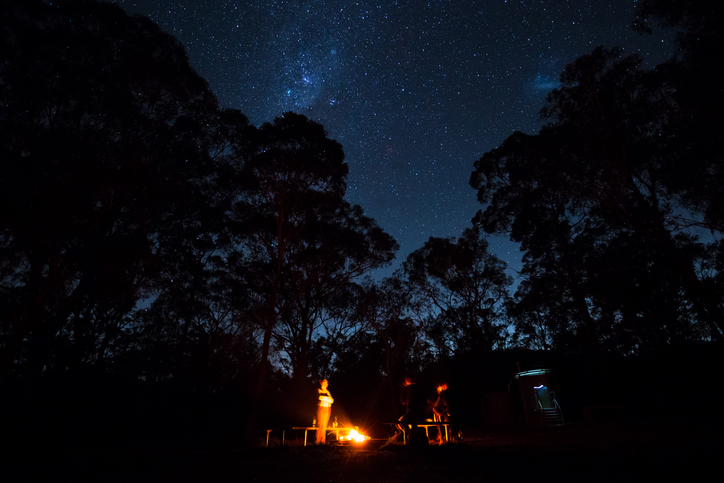The first humans, we learned in school, domesticated fire, and in so doing they changed their species’ trajectory dramatically. Now humans could cook food. Now they could live in colder climates. Now they could keep wild animals at bay.
Those early fires served another purpose, just as important: they provided a place for people to gather. And when people gather, the first thing they do is tell stories. We love stories! We love true stories, the stories of our ancestors, the daring feats others performed, the cautionary tales. And we love made-up stories, too, through which we stretch our creativity and learn truths we might not understand otherwise.
God gave us a love of stories, and then he gave us a plethora of stories to love.
It’s not accidental that Christianity is one of the three “religions of the book.” Being Christian is holding dear the stories handed down to us that define who we are, teach us our faith, and challenge us to become better people.
And no one knew the value of storytelling better than Jesus. Throughout the Gospels, we see him time and time again speaking and teaching in parables—stories—just as he is doing in today’s Gospel, when he contrasts the wise man building his house upon a rock with the foolish man building his on sand. In a scenario not unlike those we’re facing already with climate change, “the rain fell, and the floods came, and the winds blew and beat against that house.”
I have to admit this example makes me a little nervous. I live in a very small cottage in a place particularly vulnerable to floods, as my whole community was built—no joke—on a sand bar. In a literal way, I am the foolish man of Jesus’ parable: I see the peril and have chosen to live here nonetheless.
Oops.
But that’s the power in Jesus’ story, isn’t it? It hit close to home for me—well, literally, but figuratively as well. I know well and have accepted my foolishness in living where I do; having that mirror turned toward me in the guise of a story underscores what I already know to be true. So how much more powerful was it for me, then, to understand the truth that’s behind the story: that I can bear to lose my home, should that terrible storm come… but I couldn’t bear to lose something deeper, the point of Jesus’ narrative.
“Everyone then who hears these words of mine and acts on them will be like a wise man who built his house on rock. The rain fell, the floods came, and the winds blew and beat on that house, but it did not fall, because it had been founded on rock. And everyone who hears these words of mine and does not act on them will be like a foolish man who built his house on sand. The rain fell, and the floods came, and the winds blew and beat against that house, and it fell–and great was its fall!”
We’re all foolish sometimes, in some aspects of our lives, aren’t we? That’s part of human nature. Sometimes we do what’s right, and sometimes we don’t. We make good choices and we make bad choices. But behind all that day-to-day decision-making, beyond all the ups and downs of what each new moment might bring us, is the point Jesus is making: in our spiritual lives, we can’t afford foolishness.
In other words, live in a cottage by the sea if you must, take your chances in this life, but be serious about what needs to be taken seriously.
And what is Jesus so serious about, that he’s making it into a story so we will understand it, so we won’t forget? That we aren’t supposed to just hear the word of God. We’re not supposed to just read the scripture, say the rosary, go to Mass. We’re supposed to act on it. Do something about it. Take it seriously.
The power of storytelling is the power of memory. We might not remember lists, or advice, or historical dates, or what’s in the periodic table of elements, but we remember stories. They enter our consciousness at a different level from facts. They become part of us. To communicate with someone at the deepest level, at the level of memory and faith and love and everything serious, you tell a story. Stories give ideas power.
And so Jesus sits us down around a metaphorical fire and tells us a story. The story has a moral, and it’s a deceptively simple one: we are to act as though we were followers of Christ. A folk song back in the 60s said, “they’ll know we are Christians by our love.” Farther back still, St. Francis of Assisi said, “You may be the only Gospel your neighbor ever reads.” We are called to live differently, to act differently, because we have heard the word of God and it has changed our lives.
Hear Jesus’ words. Act upon them. That is what will make you the wise person, the one who thinks things through, the one who is ready for the storms.
As to where you build your physical house? Well… maybe I’m not the best person to ask about that!

Jeannette de Beauvoir is a writer and editor with the digital department of Pauline Books & Media, working on projects as disparate as newsletters, book clubs, ebooks, and retreats that support the apostolate of the Daughters of St. Paul at http://www.pauline.org.

